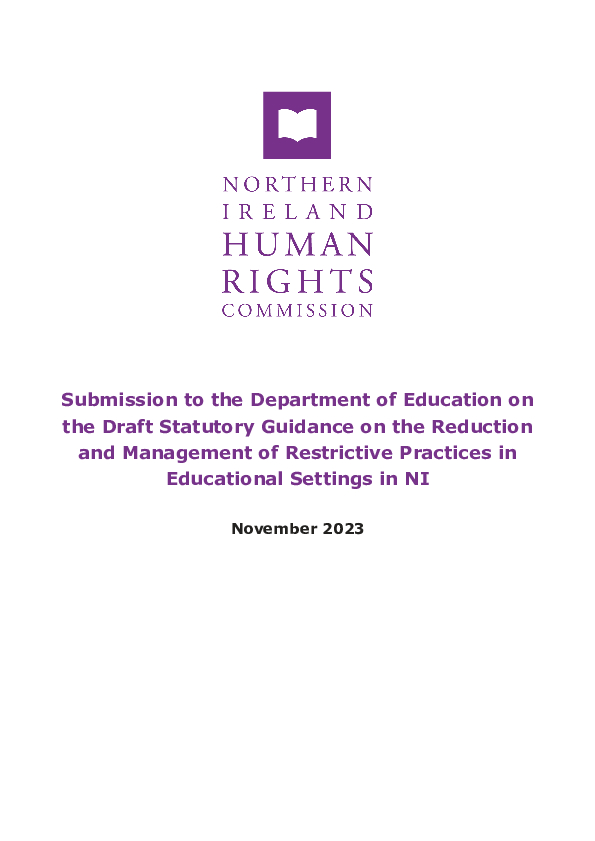Submission to Department of Education Consultation on the Draft Statutory Guidance on the Reduction and Management of Restrictive Practices in Educational Settings in NI
Date produced: November 2023.
Below is a summary of our recommendations and messages.
You can also download the full document through the links provided.
The Northern Ireland Human Rights Commission recommends:
2.9 the statutory guidance should emphasise that the aim of the policy is to eliminate the use of restrictive practices in NI schools through the implementation of minimisation strategies, in accordance with the Concluding Observations from the UN Committee on the Rights of the Child and the UN Committee on the Rights of Persons with Disabilities.
2.10 the statutory guidance highlights that the Department of Education holds overall accountability for regional minimisation of restrictive practices in educational settings in NI and specifies what actions will be taken to achieve this.
2.11 the statutory guidance contains a section on the implementation of proactive and preventative approaches to supporting children and young people with additional needs, with a strong focus on minimising restrictive practices in educational settings in NI.
2.12 the statutory guidance sets out a clearly defined list of general principles that apply to the use of all restrictive practices in accordance with human rights standards. This should include:
• All behaviour is communication and a child or young person's distressed behaviour may indicate unmet needs. All efforts should be made to understand and address those needs;
• All children and young people have a right to have their views sought and taken into account;
• Restrictive practices should not be viewed as, or become, routine practice in schools and should not form part of any behaviour, education or care plan;
• Restrictive practices should not be used for reasons relating to disability;
• Restrictive practices must only be used as a last resort, where there is no viable alternative;
• Restrictive practices should never be used to punish, to inflict pain or humiliation, or to replace proper support or care;
• There must be a real possibility of harm to the child or to staff or others if no action is undertaken;
• Any restraint should only be imposed for the shortest time necessary and in the safest, least restrictive manner.
3.3 the statutory guidance uses the FREDA principles to promote a human rights-based approach and ensure that all actions are underpinned by person-centred care and decision-making.
3.6 all educational practitioners who are authorised to use restrictive practices should receive mandatory and standardised training on when it is appropriate to use these measures and how to do so safely. This training should include reference to human rights and be sensitive to the additional needs of children and young people with specialised educational needs and disabilities.
3.7 educational practitioners receive bespoke training on proactive and preventative approaches to supporting children and young people with additional needs, with a strong focus on minimising restrictive practices in educational settings in NI.
4.2 the Department of Education publish an annual report which contains disaggregated data on the use of restrictive practices across all educational settings in NI, setting out the techniques used (how often) and reasons why; whether any significant injuries resulted; and details of ongoing strategies for bringing about the minimisation/elimination of the use of restrictive practices in educational settings in NI.
4.4 the statutory guidance sets out formal requirements for incident reviews and ensures that the process is standardised across all educational settings in NI.
5.7 the Department of Education carefully reviews its updated position on the use of seclusion to ensure consistency with human rights standards and current health and social care guidance. This should include further engagement with the NIHRC, professionals in education and health care, legal practitioners, parents/carers, children and young people and/or appropriate representatives.

Download Documents
Your browser is out-of-date!
Update your browser to view this website correctly. Update my browser now